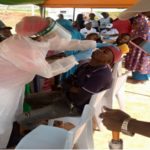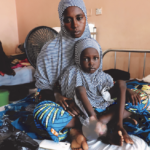Spotlight Interview
with Nari Welye
Project Coordinator for the Integrated Humanitarian Assisted Project to Internally Displaced Persons Plus 2
LET’S MEET YOU?
My name is Nari Welye. I am the coordinator for the Nigerian National Petroleum Corporation and Shell Nigeria Exploration and Production Company (NNPC/SNEPCo) ‘s funded integrated humanitarian assistance to internally displaced persons plus 2 (IHAP+2) projects implemented in Bama Town, Bama LGA, Borno state. I hold a Bachelor of Law (LLB Hons) degree from the University of Maiduguri, Barrister at Law (BL) from the Nigerian Law School Lagos, and a 2016 Mandela Washington Fellow, honored by the US Department of State. I have interests across, law, education, public management, gender mainstreaming and humanities. Over the years, I share my expertise and channels my experiences in providing pro bono legal services to indigent persons, teaching, project and development management, advocacy, mentoring and volunteering.

THE WORLD ENVIRONMENT DAY, THEMED “ONLY ONE EARTH” IN LIEU OF YOUR PROJECT, SHARE WITH US YOUR EXPERIENCE DRIVING A CLEAN AND SAFE ENVIRONMENT?
The IHAP+2 is an integrated project with health and water sanitation and hygiene (WASH) sectors. These sectors are closely linked to the environment – once there is a shift in climate change (weather and temperature patterns), there are consequences on the health and well-being of the population. For instance, in Northeast Nigeria, change in weather patterns like drought and flooding means reduced agricultural activities, increased disease outbreaks, food crisis and malnutrition. So, FHI 360’s IHAP+2 is not only contributing to improving the community health status through direct services but also the preservation of the environment. During hygiene promotion activities under the WASH sector, we educate the community about safe water usage, preventing waste and waste management, which will preserve the natural environment in the long run. The IHAP+2 project recognizes the importance of a healthy environment and incorporated a tree planting component – a first-of-its-kind innovation. This will help reduce deforestation in Northeast Nigeria. Our action may not reverse climate change but will contribute to stopping it in the future. FHI 360, in collaboration the Borno state government, will commence the tree planting activity in Bama Local Government Area. We are excited about this activity and hope to replicate its success in other communities.
THE TREE PLANTING SEEMS TO SET THE IHAP+2 PROJECT APART FROM OTHER HUMANITARIAN INTERVENTIONS. HOW IS FHI 360 WORKING TO SUSTAIN IT?
As earlier mentioned, the IHAP+2 project is integrated in its design and implementation. Health: through the provision of primary and reproductive healthcare services contributes to improving the health status of displaced populations. While WASH ensures the improved well-being of the populace through the supply of clean and potable water by rehabilitating boreholes, constructing sanitation facilities and disseminating hygiene messages. Then there is the addition of improving existing health infrastructures and services.
The IHAP+2 project operates from a government-owned Primary Health Care Clinic located at the Indimi Housing Estate, which will be renovated and upgraded to a 20-Bed Primary Health Care Center, that services about 600 displaced persons in the Indimi Housing Estate the surrounding communities of over 20000 IDPs. So FHI 360 collaborates with government staff and community members, including skilled and unskilled staff, to provide health, nutrition and protection services to set the motion for sustainability. Likewise, community leaders and members are actively involved in WASH activities like the weekly environmental cleanup campaign, during the team provides community hygiene information to ensure best hygienic practices in their homes and surroundings while educating them about the importance of tree planting to reverse the negative effects of climate change.
With an actively engaging approach from the start, the community can continue to sustain the project. So far, government officials, community leaders, and groups, including women and youth, monitor the project. We continue receive tremendous support from the community. It is encouraging to see how they have formed management committees for the health and WASH infrastructures with the guidance of our staff, they are showing that they are ready to sustain the intervention beyond the project lifespan.
FOR CLARITY, SHARE WITH US THE CORE GOAL AND OBJECTIVES OF THE IHAP+2 PROJECT?
IHAP+2 project seeks to improve access to quality health services in conflict-affected areas. In this context, Bama-Town, Bama LGA of Borno state. It also seeks to improve the nutrition status of children under five and pregnant and lactating women. It improves the access and utilization of safe WASH services, including safe and clean water, sanitation facilities and hygiene practices. Likewise, improve the overall being of women and girls who are most vulnerable through increased access to psycho-social support, economic empowerment activities, prevention, and response to gender-based violence, and child protection services integrated in health.
To improve healthcare facilities; there is an ongoing construction of a 20-Bed capacity PHCC, renovation of the existing health facility, rehabilitation of three water points, and construction of latrines. We have engaged about 38 community volunteers and vendors to ensure this project is far reaching and the beneficiaries are fully participating in all processes while accessing services.
SO FAR, WHAT IMPACT AND SUCCESS HAVE THE IHAP+2 PROJECT BEEN ABLE TO RECORD AND ARE YOU CONFIDENT BEFORE THE PROJECT CLOSE-OUT THAT ALL OBJECTIVES WOULD HAVE BEEN ACHIEVED?
Yes, we see behaviour change and improvement in the health and well-being of the populace. On numerous accounts, beneficiaries have shared their testimonies. They are saying IHAP+2 has made them better both in health and knowledge. Before the coming of the IHAP+2 Project in Indimi Housing Estate, individuals had to transport themselves to the nearest facility, which is about six kilometers away. Often they cannot because they do not have the money. For a sick person, walking is not an option. In the six months of the project, we have recorded over 5,000 medical consultations.
One success story recorded was of a woman who had lost four of her five children in infancy. Our team referred her from the community to the facility during her fifth pregnancy. She was educated about the importance of antenatal care, facility delivery and infant and young child breastfeeding practices. After her delivery, she confirmed that she started breastfeeding immediately after birth, and as a result, her child is alive and healthy.
Also, the community is excited and looking forward to the completion of the PHCC, latrines, and water points. And with the management committees already set up, they are taking their roles seriously to ensure these facilities and well maintained. Though the project’s life is not lengthy, the support from the state government in Bama and Maiduguri is commendable, hence the progress made, and the impact recorded.
FHI360 assures NNPC/SNEPCo (IHAP+2 donors) and the Borno State government that the goal of this project will be achieved, and positive impact will be realized and sustained beyond the life of the intervention.
WHAT ARE THE MAJOR CHALLENGES IN ADVOCATING FOR A SAFE AND CLEAN ENVIRONMENT, ESPECIALLY IN A HARD-TO-REACH AREA?
There are specific challenges that come with advocacy in conflict settings. For instance, language and cultural barriers, religious beliefs, illiteracy, poverty, and insecurity. The entire environment is volatile with protection concerns, lack of economic activities, and high rate of movement of people from unsafe communities to relatively safe areas. These are key challenges that every FHI 360 project faces as a whole, not just the IHAP+2 project.
Our community volunteers, who are members of the host community, understand the language, culture and religion, so this eliminates some of the barriers. We train the volunteers to deliver quality services by FHI 360’s standard of operations and code of conduct, especially on protection from sexual exploitation and abuse and protection of program participants. They understand that they are the face of FHI 360 in the community. They drive behavior change among the people. This process requires a consistent daily effort to gain the community’s trust, and we have successfully overcome that hurdle by having a robust community engagement strategy and conducting continuous advocacy.
Furthermore, these communities are highly dependent on humanitarian assistance and have no source of livelihood thus increasing the practices that aid global warming like chopping down trees for use as cooking fuel. This is a huge issue to deal with, especially without alternatives for people in camps or camp-like settings without economic activities to meet their needs.
We will continue to create awareness about climate change and hygienic practices while ensuring more persons, including partners, join in tree planting across the state.
SOMETIMES GOVERNMENT IS AT LOGGERHEAD WITH NGOs. HOW DO YOU MANEUVER TO ENSURE YOU MEET THE NEEDS OF THE COMMUNITY?
In this project, we are looking at improving displaced persons’ lives, sustainability of the donor’s investment and reverse the effect of climate change with the tree planting component and from the project’s inception, FHI360 has collaborated with the state and local government, signed the MOU, and gained its approval for the constructions and community activities while constantly engaging them through supervisory visits and routine program update meetings.
HOW DO PARTICIPANTS RECEIVE AND ACCEPT IHAP+2 AND THE MESSAGE YOU SHARE?
There are individual differences, some people learn faster than others, some are hesitant as a result of fear, having survived many attacks and displacements in the past. It can be exhausting for them when an NGO worker is telling them to wash their hands frequently and stop open defecation to prevent diseases. However, sharing success stories and encouraging peer to peer advocacy has drastically caused a wide acceptance and increase in referrals from the beneficiaries, other components like psycho-social support helps address emotional trauma and stress. A ten-year-old child that was born in crisis years has spent all his life fleeing attacks it becomes extremely challenging for that child to settle in school, in such instances daily psycho-social support and a improved child care can becomes paramont in stabilizing the child.
DO YOU THINK THE NIGERIA GOVERNMENT IS EMBEDDED WITH THE RIGHT POLICIES TO ATTAIN THE SDG GOALS ON OR BY THE YEAR 2030?
Nigeria may be on its way to attaining the SDGs, but it may take a bit longer than 2030. I believe that Nigeria is improving, and with the right leadership and policies, we can achieve the SDGs. If you take a critical look at the entire economy, so much is left unattended. The Government cannot focus on one sector and leave the others to suffer. Every sector depends on each other, so if you only build education, for instance, health suffers and will affect education eventually. The people in the government and lawmakers should be aware of current concerns and problems.
For the past ten years since the crisis started, farming activities are threatened around the Northeast Nigeria. People cannot access their farmlands, and drought has significantly reduced crop production and animal rearing. Thus, the need for the Government to explore other options and alternatives for the people’s survival and economic sustenance.
Nigerians must support the creation of policies and be accountable in practice to achieve the SDGs by 2030.
IN YOUR WORDS, WHY DO YOU THINK PEOPLE SHOULD JOIN IN THE ADVOCACY TOWARDS CLIMATE CHANGE WITH ENTHUSIASM?
The theme for this year’s World Environment Day is ‘ONLY ONE EARTH.’ We have only one earth. So, here is my message to everyone out there; ‘When you are walking out of the room, turn off the light to save energy. When you are brushing your teeth, turn off the tap to save water, do not waste resources for the fun of it, refrain from committing waste, dispose of waste properly.’ In the words of my father, “Always leave darkness behind you.” A statement we often laugh about at home, but this was his way of teaching us to turn off the light bulbs, electronic sets and things that are not in use to save energy and to save our planet.
LASTLY, WHAT VIEW OF YOURS WOULD YOU LIKE TO PASS ON TO THE WORLD AS WE CELEBRATE THIS YEAR’S WORLD ENVIRONMENTAL DAY?
In Africa, statistics show that between 75 and 250 million people are projected to be exposed to increased water stress. That means rain-fed agriculture could be reduced by up to 50% in some regions, and we are already seeing that in Northeast Nigeria. Agricultural products, including access to food, may be severely compromised. This is how much climate change affects our environment and pushes people into many societal ills. We need to put these statistics out there for people to understand why we need to take immediate action against climate change. We are responsible for reversing the negative effect of climate change.



